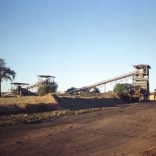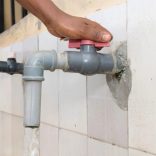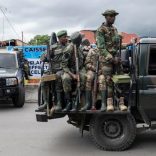Mozambique: Mining tax to provide €10.2M for community development in 2025
Cabo Delgado: Displaced are going hungry in Zambézia – DW

Photo: DW
Families who have fled terrorists attacks on their villages used to grow food in their new locations, but this has been seriously affected by the drought. To relieve hunger, IDPs are eating seeds and leaves. Officials acknowledge that there is not enough help for everyone.
Catarina Manuel, an IDP from Cabo Delgado, lives with her family in the Nicoadala accommodation centre.
An insufficient diet, based on watermelons and cucumbers, is all that displaced families from Cabo Delgado have to alleviate their hunger in Zambézia province.
The days are difficult for dozens of IDPs because of a lack of food at the Mutchessane accommodation centre in Nicoadala.
“These are watermelon seeds. I roast them and mix them with leaves. We are very hungry here – we have no food. The food I had, I received a long time ago, in January of this year,” explains Catarina Moisés, who fled the terrorist attacks with her children.
Some people displaced from Cabo Delgado have been staying at the centre, which has room for 80 families, since December last year. Upon arrival, many of them started growing cereals and vegetables on machambas nearby, but were surprised by the weather.

The drought has worsened.
No rain fell, and the crops were destroyed by the intense sun. Many eat cucumber and watermelon seeds to satisfy their hunger. Those who are unable to pick seeds eat leaves.
“We fled the war in Medumbi, and I arrived here in December. There is a lot of hunger here, that’s why we are lying on this mat. It is no joke, it’s due to hunger. We made vegetable gardens, but nothing came of them because of the heat. In addition to not having food, we lack clothes. My wife and I arrived with only the clothes we wore,” Maurício Bonifácio tells us.
Several months ago, the victims stopped receiving food support. Some live on the help sent by family members in other parts of the country.
“On these days, I eat in my own way. I ask a grandma in the village for a bucket of corn and take it to the mill to make flour. That’s what supports me, but others have no family,” Joaquim Ndobe, who fled Cabo Delgado with two children and his wife, relates.

Help is not for everyone
Local administrator João Nhambessa says that support arrives regularly, but it is not for everyone. The Association of Natives and Friends of Cabo Delgado and Frelimo have donated food and clothing, he says.
“In addition, every three months, we also get donations. The help is not for everyone, only for newcomers. They are entitled to aid for the first three months – after that they have to support themselves,” he explains.
The number of those displaced from Cabo Delgado by the armed conflict there is likely to increase. Local government officials are expecting more to arrive in Zambezia province as a result of the attack on Palma.












Leave a Reply
Be the First to Comment!
You must be logged in to post a comment.
You must be logged in to post a comment.